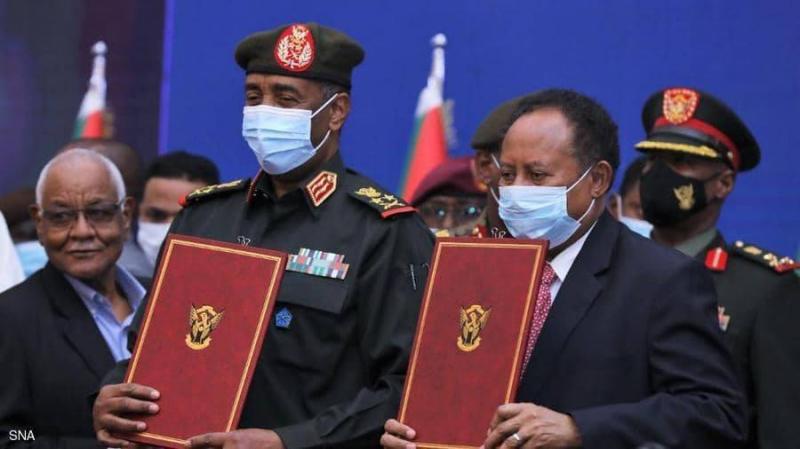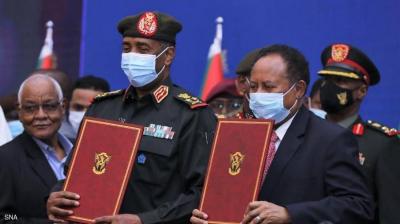International, regional, and Arab entities welcomed the political agreement in Sudan that aims to reinstate Prime Minister Abdullah Hamdok to his position. The welcome for the Sudanese political agreement came from the Troika countries, which include Norway, Britain, and the United States, as well as the European Union, Switzerland, and Canada. A joint statement from these parties affirmed support for a successful democratic transition in Sudan, emphasizing that the next steps must meet the aspirations of the Sudanese people. The statement also called for the immediate release of all political detainees across the country.
U.S. Secretary of State Antony Blinken expressed his approval of reports suggesting that talks in Khartoum would lead to the release of all detainees, the return of Prime Minister Abdullah Hamdok to his position, and the lifting of the state of emergency. Blinken urged all parties to engage in further discussions and intensify efforts to complete the main transitional tasks towards establishing civilian democratic leadership in Sudan. He reiterated his call for security forces to refrain from the excessive use of force against peaceful protesters.
The international mission in Sudan also welcomed the agreement, urging transitional partners to promptly address outstanding issues to complete the political transition comprehensively. In its statement, the mission emphasized the need to protect the constitutional order to preserve the basic freedoms of political action, freedom of expression, and peaceful assembly.
### Arab Welcome
For his part, the Secretary-General of the Arab League, Ahmed Aboul Gheit, welcomed the political agreement between Hamdok and Burhan, confirming that it resulted from significant Sudanese efforts backed by Arab and international support. In Cairo, Egypt welcomed the signing of the political agreement between Burhan and Hamdok and praised "in this context, the wisdom and responsibility displayed by the Sudanese parties in reaching a consensus to succeed in the transitional period for the benefit of Sudan's higher interests." Egypt expressed hope that the agreement would represent a step towards achieving sustainable stability in Sudan, opening avenues for development and prosperity for the Sudanese people.
In Riyadh, the Saudi Ministry of Foreign Affairs expressed the Kingdom's welcome for what the transitional parties in Sudan have achieved in reaching an agreement on the tasks of the upcoming stage and restoring transitional institutions, leading to elections on schedule, and forming a competent government to advance the transitional process and contribute to realizing the aspirations of the Sudanese people, while preserving the political and economic gains achieved and protecting the unity of all Sudanese political components. The ministry reaffirmed the Kingdom's steadfast and continued support for everything that aims to achieve peace and safeguard security, stability, and development in the Republic of Sudan.
### African Welcome
On its part, the Democratic Republic of the Congo called on the African Union to meet to lift Sudan's membership suspension following the political agreement between Hamdok and Burhan. African Union Chairman Moussa Faki also welcomed the Sudanese step towards restoring constitutional legitimacy and called for national reconciliation among Sudanese parties. The African Union urged the international community to renew its solidarity with Sudan to enhance peace and democratic readiness for free elections.
### Release of Political Detainees
In the meantime, Sudanese authorities began releasing political detainees after signing the political agreement between Sovereign Council Chairman Abdel Fattah Burhan and Prime Minister Abdullah Hamdok. The agreement stipulates reinstating Hamdok as Prime Minister and emphasizes the need to expedite the completion of all transitional governance institutions.
A new page has been signed, with Burhan and Hamdok reaching a political agreement to exit the cycle of conflict and establish a new consensus between military and civilian parties. Transitional Sovereign Council President Abdel Fattah Burhan stated, "We had been living in a crisis for a long time, and today, with the signing of this political agreement, we were able to genuinely establish a transitional period as we envisioned it and as the Sudanese people imagined it at the beginning of their transformation or in the early uprising that occurred in April 2019."
Meanwhile, Sudanese Prime Minister Abdullah Hamdok remarked, "Let us unite as Sudanese and look at the interest of the homeland. I will not tire of repeating the statement: let us agree on how Sudan is governed and leave the choice of who governs Sudan to this great people."
The agreement that reinstated Hamdok as head of the government granted him full rights to form a government of non-partisan competencies, while the Sovereign Council's civilian and military members would focus on oversight without interfering in the executive authority's work. Burhan and Hamdok's agreement calls for the formation of a unified national army and confirms the release of political detainees, as well as establishing a technocratic government.
Meanwhile, the Central Sudan Doctors Committee reported that one person was killed due to gunfire during demonstrations in Omdurman yesterday, raising the death toll since October 25 to 41. Sudanese police dispersed a protest opposing the Burhan-Hamdok agreement that was attempting to reach the presidential palace in the capital, Khartoum. The Sudanese Professionals Association and the Forces for Freedom and Change announced their opposition to the agreement.




